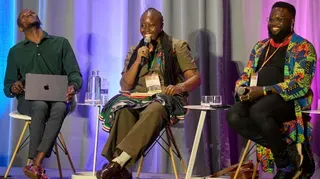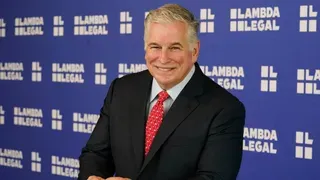September 12, 2011
GOP-Led NC Legislature Nears Marriage Equality Vote
Kilian Melloy READ TIME: 4 MIN.
North Carolina is the only state in the Southeast without a gay marriage ban in its constitution. The idea has gone nowhere in the last decade because Democratic leaders quashed Republican efforts to debate amendment referenda.
Now with Republicans in charge of the Legislature for the first time in 140 years, conservatives are making their move. Lawmakers return Monday to Raleigh to debate proposed amendments, including one to let voters next year decide if a state law already on the books defining marriage as between one man and one woman should be imprinted into the state constitution as well.
"It's time that we settled this issue," said GOP state Rep. Dale Folwell of Winston-Salem, the No. 2 leader in the House and a key amendment proponent.
Gay rights supporters and gay-friendly companies in the state have been attacking the proposal, saying a 2012 statewide ballot is unnecessary and would humiliate the state in a nation that's become more accepting of same-sex relationships. They say it would discourage business from coming to North Carolina, where unemployment has crept back above 10 percent.
"It makes no sense that North Carolina in a dark economic hour, should signal out a minority of its population for public judgment," said Andrew Spainhour, general counsel of Greensboro-based tableware seller Replacements Ltd., where as many as 100 of the 450 employees are gay, including the company founder.
The marriage debate rises against a backdrop of looming, critical elections. A divisive ballot measure in November 2012 could help bring conservatives to the polls in a state where Barack Obama won in 2008 by only 13,000 votes and which is hosting the Democratic National Convention. Democratic Gov. Beverly Perdue also faces a tough re-election fight next year.
"There's no doubt that there would be some advantage in motivating voters for Republican candidates," said Ferrel Guillory, director of the Program on Public Life at the University of North Carolina at Chapel Hill. On the gay marriage issue itself, he added: "We are polarized on this."
Political and social activists nationwide are keeping a close eye on the debate in Raleigh, which could be decided by a few votes. Groups are investing money and time in what could turn into a yearlong fight with deep political overtones. It could become a bellwether on gay marriage as a political issue.
"Once it gets on the ballot, it's going to be a top priority for us," said Tom McClusky, a vice president at the Washington-based Family Research Council. Its legislative arm ran radio ads urging listeners to call a dozen legislators considered on the fence.
Thirty states have language in their constitutions limiting marriage to a man and woman. Minnesota voters will consider an amendment next year. But gay marriage supporters have seen victories both in politics and public acceptance.
New York became the sixth state with the District of Columbia to sanction same-sex marriages. In North Carolina, support for gay rights and acceptance of same-sex partnerships has expanded in recent years beyond college towns and other urban pockets. The number of same-sex domestic partners in North Carolina increased 68 percent over the past decade, according to U.S. Census figures.
"Each person has to decide what's right for themselves but I don't think we need to legislate those sorts of things," said Byron Greiner, 53, an Asheville real estate agent and president of the city's downtown association who has been in a same-sex partnership for 18 years. "I'd hate to see North Carolina go backward."
Greiner and others argue having a constitutional amendment on the ballot would make companies in emerging fields think twice about expanding in North Carolina. They said the amendment language if approved would lead to uncertainty over same-sex partner benefits, child custody rights and domestic violence laws.
"You don't use the constitution to disenfranchise and hurt your fellow citizens," said Alex Miller, interim leader of the gay rights group Equality North Carolina.
Amendment supporters argue traditional marriage would be better protected against potential legal challenges by same-sex couples married in other states. They said they've seen no proof businesses have refused to come to North Carolina because of the current marriage law. Amendment language expected to be considered Monday in a Senate committee aims to make clear companies aren't impeded from offering domestic partner benefits to their workers.
House Speaker Thom Tills, a Republican from suburban Charlotte, is a former consultant for Price Waterhouse who worked on a diversity initiative that was expanded to recruit gay and lesbian employees. Tillis said he'll vote for the amendment but wants language that he believes won't diminish the attractiveness of doing business in North Carolina.
"We're going to get the legislation right," he said.
The amendment must receive support from three-fifths of the members in both the House and Senate to go to the ballot. Constitutional questions aren't subject to gubernatorial vetoes. A simple majority of voters would have to agree to put it in the constitution. Most of the attention has focused on the House, where the Republican majority falls four seats short of the 72 votes needed if the entire GOP caucus voted together.
That will require Republican leaders to retain six Democrats who co-sponsored a gay marriage amendment earlier this year, while keeping all GOP lawmakers in line. Black Democrats in rural areas were among those being targeted by amendment supporters. Not all Republicans were on board late last week.
"We don't want to make the mistake that everything we think is important, we should put it in the constitution," said first-term Rep. Chuck McGrady, a Republican from Hendersonville, who called himself undecided. "I'm struggling with it. I'm trying to understand all the facts."
Kilian Melloy serves as EDGE Media Network's Associate Arts Editor and Staff Contributor. His professional memberships include the National Lesbian & Gay Journalists Association, the Boston Online Film Critics Association, The Gay and Lesbian Entertainment Critics Association, and the Boston Theater Critics Association's Elliot Norton Awards Committee.




